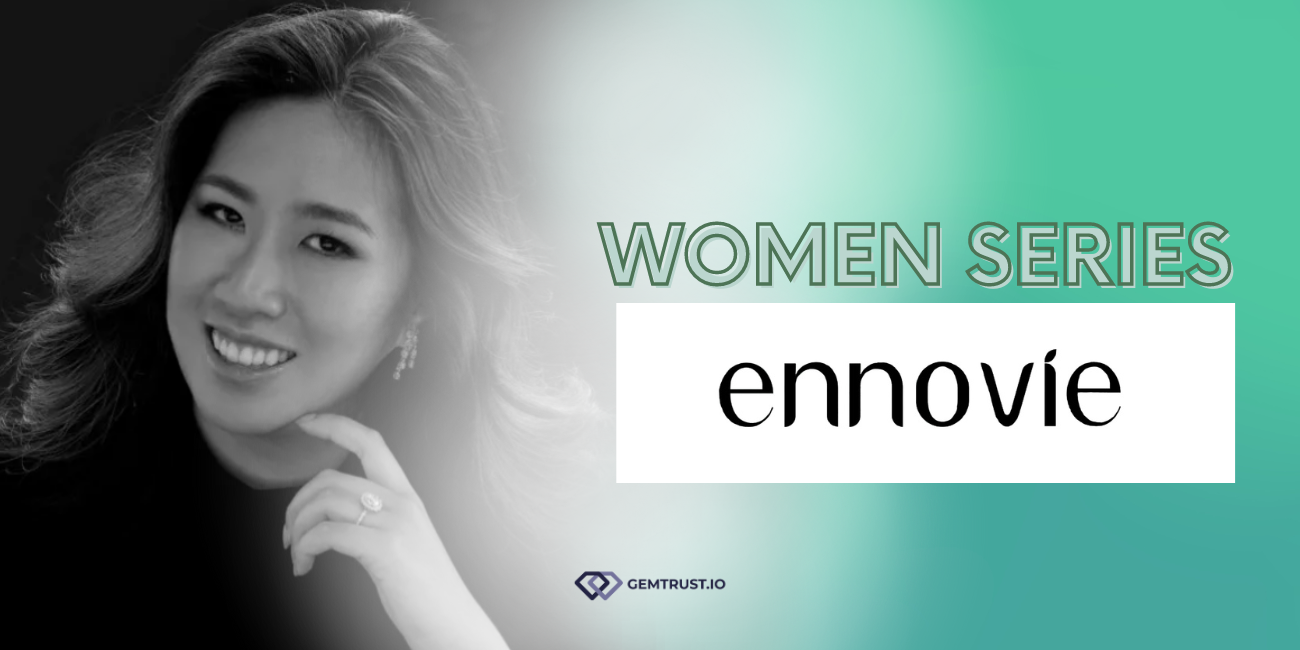
Women’s Series: PROUD LIMPONGPAN of Ennovie
By Isabella Yan
In our ongoing women’s series, we speak with entrepreneur Proud Limpongpan of Ennovie, about the challenges in the jewellery manufacturing sector, how she moved from international high finance to pioneering sustainable jewellery.
Thailand is one of the best kept secrets for exquisite high jewellery craftsmanship. With the majority of international fine jewellery being manufactured in Thailand, talented South-East Asian goldsmiths have traditionally remained behind the scenes. Thai entrepreneur Proud Limpongpan strives to change this with Ennovie, a sustainable and eco-friendly jewellery manufacturer in Bangkok. By putting Thai craftsmanship and sustainability at its core, the aim is to be carbon neutral or even carbon negative in the near future.
When Proud Limpongpan started out, she did not foresee that jewellery would become a career. In fact, her focus was on identifying needs in the retail and technology market by building up companies from scratch. She was hired by L. Catterton to help with the global operational transformation of a private equity backed jewellery brand. This gave her a foray into the jewellery world, turning a sleepy manufacturing plant into Bangkok’s first solar powered jewellery factory.
Could you tell us about your background?
I’ve spent my career identifying needs in the market and building up companies either from scratch or from turnarounds of majority buyouts. After graduating with a Bachelor of Science in Economics from the London School of Economics and Political Science, I started off my career as a consultant at the Boston Consulting Group, focusing on strategic initiatives for C-suite clients in the Tech and Telecommunications industry. I then went to pursue my MBA at Harvard Business School with the hope to get into either impact investing or retail. I ended up going into retail first, via working with L Catterton to complete the global operational transformation of a jewellery brand. It was very much by chance that they needed someone with knowledge of Thai language and culture and a consulting background to help this specific portfolio company.
After deciding it was time to pursue something myself, I invested in a small workshop of 20 people and built up Ennovie into a sustainable jewellery manufacturing company.
What compelled you to become involved in the manufacturing of jewellery and why did you start Ennovie as opposed to a retail brand or a cutting factory?
I didn’t realize that Thailand was basically the capital of jewellery manufacturing and trade. The sector is the country’s top 5 exports, and there are many international brands that produce in Thailand. Unfortunately, many luxury brands produce in these communities and give little to no credit or support to the manufacturers and rarely mention the cities themselves. In much of the world, those working in manufacturing exist only behind the scenes—they are nameless, often forgotten about, and frequently paid subsistence wages despite working very hard. I wanted to change this. I really liked learning about the supply-side of jewellery making as it made me realize how these beautiful creations came to life. I chose to focus on Ennovie because the impact you can make in the industry is larger as we can work with large brands which have their own footprints already.
What sets Ennovie apart from other jewellery manufacturers?
We strive to move fast and are not constrained by processes and bureaucracy that hinder larger companies. We are constantly committed to find creative solutions that improve our quality, speed, and service. We have built a place where all craftsmen are respected and yet challenged to grow. Everyone here has a voice, an opinion, and a right to help innovate. If the team is efficient and able to produce high-quality products for customers, then the gain received is shared by everyone. This way, we encourage mini entrepreneurs within the team. We’ve also committed to being carbon-neutral by year end.
What was your biggest fear when starting Ennovie?
That other people wouldn’t see our vision and the reasons why we wanted to change this age-old industry so much. Before we started to build our new sustainable building, we took the drawings and the dreams of what it could be to many brands and asked if they would be willing to switch from their current suppliers to give us a chance. Fortunately, we’ve had a lot of commitment and were able to secure a bank loan to build.
What was the main challenge you encountered setting up Ennovie?
Convincing a bank to help give us a loan. We were growing 4x every year, something that was never seen before in manufacturing companies, and banks were very reluctant to believe that we would keep growing since their other clients were having issues serving loans or adapting to changes in the international market. Luckily one bank committed to giving us a loan if we hit our planned targets by year-end in 2018.
What do you love most about working in the gems and jewellery industry?
I love the variety of people from all walks of life and from different countries that come to Thailand to produce beautiful creations that are then appreciated around the world.
How can we make the gems and jewellery industry more inclusive?
As someone from outside the industry, I would love to see more events happening. Events for the sake of supporting each other, sharing best practices, not for PR or trade.
Is the next Thai female generation attracted to the gems and jewellery industry? How do you inspire them to be involved?
I think they are, but I believe most are attracted by the retail or branding side of it. You can see that there are now a lot of new designers on instagram or sold at small kiosks in malls. A lot of people I know that are second or third-generation business owners from the manufacturing side are also creating their own brands.
The quality of Thai craftsmanship is exceptionally high, and often overlooked and underrepresented. Do you think things will change?
Yes, I think this will definitely change. In the clothing and textile industry, customers are already asking ‘who made my clothes’. I believe this will continue and will also happen to the jewellery industry. Supply chains will have to become more transparent, brands will have to start reporting and tracing their supply chains in accordance with Environmental, Societal, and Governance concerns, especially with the adoption of traceable technologies such as Blockchain.
What advice do you have for females starting out in the industry, especially for those looking to work in manufacturing or jewellery making?
I don’t think this advice would be different if the person listening were female or male. I’d say don’t do CSR, but actually try to implement Environmental, Social, and Governance (ESG) elements into your business with real monetary reasons as to why they make sense. Learn about technologies as they allow for production flexibility and efficient tracking.
Who have been your biggest mentors in this industry and what is the best advice they have ever given you?
Cyril Baudet (currently VP of Finance for Kering). He introduced me to this industry and made me realize how interesting it is from a pure business perspective. He showed me how to effectively implement an Enterprise Resource Planning (ERP) system (not an easy feat!) so that I could do my own at Ennovie, and more importantly how to think critically about how the industry has been operating and how to start transforming it for the future.
What is next for Ennovie?
One of the things we are working on is a sustainability report so that clients are proud to tell their customers they produce with us in Thailand and the jewellery production causes the least carbon emission possible. We’ve currently been able to help brands with their inventory risks by having a production lead time that is less than 10 working days. We’d like to have more brands onboard that are willing to try a new ordering schedule with us rather than having to order months in advance and then ending up with leftover inventory and the inability to free their cash flows. Having just invested in a high-precision CNC machine that offers unrivalled accuracy and shorter lead times, we are looking for newer technology and the ability to have more accurate casting calibrations.
About the Author
Isabella Yan, Journalist and Founder of Art meets Jewellery.
Isabella Yan is a British gemmologist and journalist specialising in the fine gems and jewellery industry based in Thailand. She writes for international jewellery and industry magazines including Rapaport, JNA magazine, Solitaire magazine, Upscale Living, Solitaire International, GAMMA Journal, Adorn Insight and Trendvision. She is the creator of Art Meets Jewellery, an online platform that looks at the world of jewellery and gems through the eyes of an artist. In 2021, she launched the Women's Series, a monthly column that aims to celebrate and amplify women’s voices in all facets and levels of the industry. She is always on the lookout for one-of-a-kind jewellery, that showcase creativity and cutting edge design. Her goal is to foster and shine light upon original and creative designs in Asia.
Prior to journalism, Isabella worked in the international art world in London, and held positions in Special Projects, Marketing, Sales and Communications for a gemmological institution and a jewellery manufacturer in Bangkok. An Accredited Gemologist from the Asian Institute of Gemological Sciences and the Gemmological Association of Great Britain, Isabella holds a Masters in Art Business from Sotheby's Institute of Art and a Bachelors in Art History from the University of Warwick.
Follow her on Instagram @izza_gem and on Artmeetsjewellery.com.
TAG : Women’s Series, Proud Limpongpan, Ennovie, Thai entrepreneur, jewellery manufacturing, Isabella Yan, Interview, Women series, Art Meet Jewellry, Sustainablity, Environmental friendly jewellery, Thai craftsmanship, Thai jewellery, eco-friendly jewellery manufacturer, Carbon negative manufacturing, Transparent supply chain
